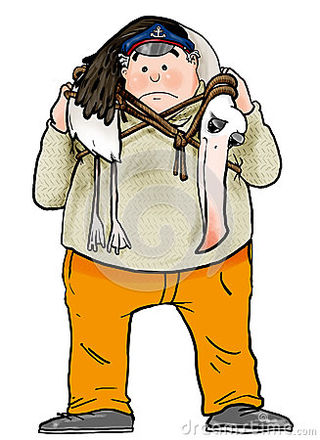Career
Job Search With a Dead Bird Hanging From Your Neck
How to be offensive inoffensively.
Posted December 3, 2016

Samuel Taylor Coleridge's 18th Century poem "The Rime of the Ancient Mariner" mentions a dead bird (Albatoss) hung around a sailor’s neck to symbolize the burden he must bear in public.
Many of our clients symbolic dead bird hanging around their necks during their job interviews.
There are three versions of the Albatross: long service in a company with a poor public reputation, age, and physical disability.
In this article we will discuss how to land an interview despite the dead bird around your neck and how to deal with it once you get in the interview room.
Working With and Around Recruiters.
When dealing with recruiters, try to avoid a direct approach. You will be too easily dismissed. You have an Albatross around your neck. Have a third party write a letter on your behalf focusing on why you are an exceptional candidate.
Managing the Albatross in Your Interview.
If you do get to see a hiring authority, you may hope the albatross issue doesn’t come up.
That would be a mistake.
Hiring authorities like to avoid unpleasant discussions like the following:
“After twenty years serving a discredited company, will you bring your former employer’s ‘winning ways’ into our business? And if you say ‘Of course I won’t,’ how can I believe you?”
At the same time, expressing negative comments about your former employer won’t get you offers. The rationale is: “Today she’s saying negative things about her former employer. What might she say about me if we part company?”
You feel you are in a “heads you lose, tails you lose” situation.
As Otto von Bismark once famously said, “The best defense is an offense.” The best way to deal with your dead bird is to confront the issue in a polite manner.
Here’s a format we use with our outplacement candidates:
During an interview, ask: “What Do You Know About My Company?” This question allows you to gauge how large an albatross the other person perceives you to have around your neck.
If the person says, “I know very little about the company,” then you can begin to frame your time with the albatross your own way. If the person says, “Here is what I know…” let the hiring authority go into the details about what he/she thinks is known about the albatross company. Do not interrupt, and do not disagree.
Below is an example:
The hiring authority states that he is aware your company went bankrupt. He believes that your company was dysfunctional, and inwardly-focused. They failed to appropriately respond to changes in the industry.
Your response: “You’re right. But our company was also complex. And within my area of responsibility, we did some exciting, innovative things. You are right about the company culture a whole. But we were a cultural island.
I’m interested in helping you be the best company you can be. I have no intentions of bringing my former company’s ways of doing business to your company.”
The Age Albatross
Concerns about age may reflect a desire to have a youth-oriented culture. There is not much you can do about it.
But beyond age itself there are secondary perceptions associated with age. And some of those secondary perceptions may be worth challenging in a polite way.
One common perception is that as people age they grow more reluctant to adapt to change.
Silence on this issue does not work in your favor.
We tell our job candidates to conduct good primary and secondary research about the target company. Try to guess what the secondary concerns about age might be. If the issue is rapid adaption to change, address the issue head on. Use this formula:
“If I was sitting where you are sitting and looking at someone of my age, I’d be wondering if she has the flexibility to work in such an innovative company. In case you are, I want you to know that I’m taking a course at my local community college on cyber security. We all know it is an important issue and I want to be on top of it for my next employer.”
The Job Duration Albatross
You know you stayed at one company for too long. Or your tenure at too many companies was too short. Using the “If I was sitting where you are sitting…..” approach to tackle the issue in a positive manner.
The Physical Disability Albatross
Physical disability is a topic most employers will not address because of its potential for legal liability. And yet job candidates must confront the issue.
For example, one of our outplacement candidates had a club foot. This required that he wear very large shoes. Interviewers would notice the shoes and make no comment. And he got no job offers.
We recommended the following approach. Instead of hoping interviews would fail to notice the shoes, draw the interviewer's attention to them:
“You must have noticed these large shoes. I have club feet. If I was sitting where you are sitting, I would wonder about the impact of my foot for doing the job.
"Here is the good news: this foot has no impact on my ability to do the job, my drive, or my stamina. It has no impact on my general health or my life span.
"Here is the bad news: you don’t want me on the company soccer team!”
Confronting the issue with humor made the issue a discussable subject.
He got hired.
We All Have at Least One Albatross.
As we move through life, we all accumulate dead birds that symbolically hang around our necks.
Trying to ignore the Albatross and hoping others will too is a defensive strategy.
Defense alone won't help you win the job search game.
Try our approach: inoffensive offense.
###
Coleridge, S. T. (2001). Rime of the Ancient Mariner. Sterling.




